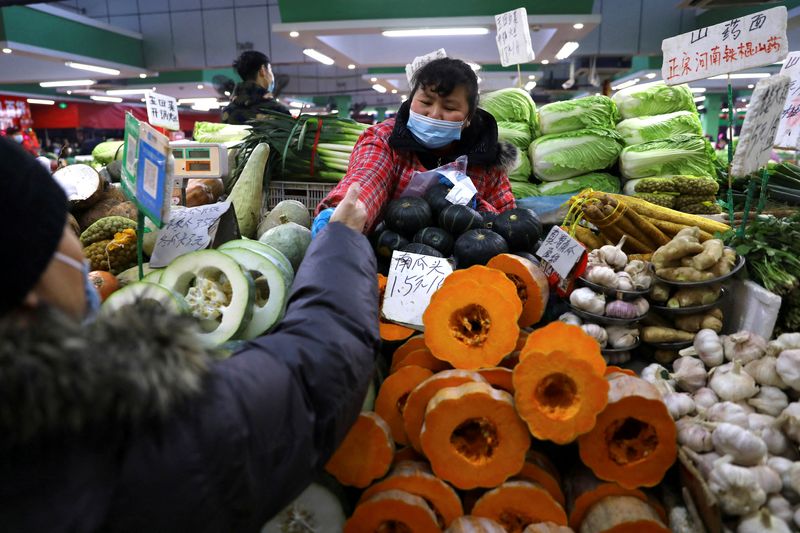BEIJING (Reuters) -China's factory-gate and consumer prices rose faster than expected in March as Russia's invasion of Ukraine, persistent supply chain bottlenecks and production snags caused by local COVID flare-ups added to commodity cost pressures.
The surge in raw materials costs is hobbling economies worldwide and in China has raised questions among some analysts about just how much its central bank will be able to ease monetary policy.
China's producer price index (PPI) increased 8.3% year-on-year, data from the National Bureau of Statistics (NBS) showed on Monday. While that was slower than the 8.8% seen in February, it beat a forecast for a 7.9% rise in a Reuters poll.
Upstream pressures pushed up consumer prices, which rose 1.5% year-on-year, the fastest in three months, speeding up from 0.9% in February and beating expectations of 1.2%.
Nomura analysts said possible delays in crop planting caused by new COVID-19 outbreaks in the country and the Ukraine conflict could create new food price pressures in the second half of the year.
"Rising food and energy price inflation limits the space for the (People's Bank of China) to cut interest rates, despite the rapidly worsening economy," Nomura said in a note.
While the year-on-year PPI rise was the slowest since April 2021, this was mostly due to the lower comparisons from late 2020 and early 2021 seen in the previous months.
The monthly increase of 1.1%, meanwhile, was the fastest in five months, driven by surging prices of domestic oil and non-ferrous metals due to geopolitical factors, an NBS statement said.
Oil and gas extraction prices grew 14.1% on month, and petroleum,coal and other fuel processing prices rose 7.9%.
The uncertainty in the Ukraine war will affect global goods supply, "adding greater imported inflation pressure on China", said Wang Jun, chief economist at Zhongyuan Bank.
NEW RISKS
The world's second-largest economy came under downward pressure in March with renewed COVID-19 outbreaks and the manufacturing and service sectors reporting declines in activity.
Authorities have unveiled policies to support the economy, including greater fiscal spending and reductions in income tax for small firms.
While consumer prices have risen, inflation remains modest by global comparisons, pointing to weak consumption caused by Beijing's strict COVID control measures.
Against a year ago, food prices fell 1.5%, compared with a 3.9% decline in February, resulting in a drop of 0.28 percentage points in headline CPI.
China reported 26,411 new asymptomatic cases for Sunday, more than 25,000 in the financial hub of Shanghai, which is currently under a city-wide lockdown.
Iris Pang, chief economist for Greater China at ING, expects Shanghai's economy will shrink 6% this month alone if the current lockdown persists, resulting in a 2% gross domestic product decline for the whole of China.

"Although the price of some goods will remain high in the near-term, we think wider inflation will remain contained, giving the PBOC room to ease policy further," said Sheana Yue, China Economist at Capital Economics.
For now, most analysts expect the PBOC to lower borrowing costs, and cut reserve requirements for banks or lower interest rate to pump more cash into the economy.